News
Building a Vibrant Rotary Club under Nigeria’s Economic Hardship: A Path to Impactful Service

By Gloria Ikibah
Nigeria is Africa’s largest economy, and is currently navigating challenging economic times. Inflation is high, unemployment is a daily struggle for many and cost of living has skyrocketed beyond unimaginable levels.
Amidst this backdrop, the question arises: how can organizations like Rotary Clubs, which are driven by service, continue to make meaningful impacts in their communities?
Rotary Clubs in Nigeria have a long-standing tradition of service, but in this current economic climate, the approach to community service needs to adapt.
The key lies in being innovative, strategic, and closely aligned with the real needs of the people.
Rotary Clubs in Nigeria can remain full of energy, life and make a lasting difference during these trying times by:
1. Firstly, Understanding the Needs of the Community
The first step in building an effective and vibrant Rotary Club in any economic situation, particularly in tough times like these, is understanding the community’s needs. With increasing poverty levels and a widening gap between the rich and poor, Rotary Clubs must be focused on tackling issues that directly affect the community’s quality of life.
Steps to follow to get positive results:
- Conduct a needs assessment, by engaging with traditional and religious leaders, women, businesses, and even community members directly to understand the pressing challenges. Is it unemployment, lack of healthcare, poor education, or inadequate access to clean water or even food? Once you identify the major needs, your club can channel resources into areas where they’ll have the most impact.
- Tailor projects to the economy: In tough economic times, smaller, scalable projects may have more immediate benefits than large, resource-intensive ones. For example, offering vocational training programs to youths can help them gain skills that lead to employment or entrepreneurship.
2. By focusing on grassroots issues, Rotary Clubs in Nigeria can provide real solutions that meet the day-to-day needs of their communities, even with limited resources.
Leveraging Community Assets will involve doing more with less resources available.
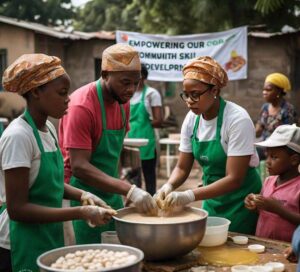
At periods when there is economic hardship in thecountry, resources such as funds, materials, and volunteer manpower may be more difficult to come by. However, Rotary Clubs can overcome these constraints by leveraging community assets and partnerships.
Steps to take:
- This will include the Use of local expertise. There are always large numbers of skilled people in every community who may be willing to volunteer their time and talents. For example, local artisans, professionals in the medical, education and retirees can be valuable resources for community service projects. A local carpenter might help with a building project, or a doctor may offer free health seminars or medical outreach.
- There is also the need to form strategic partnerships with local businesses, Non Governmental Organisations NGOs, and even government agencies to share resources. A Rotary Club in Nigeria can collaborate with small and medium-sized enterprises (SMEs) for Corporate Social Responsibility (CSR) projects. This could be a win-win, as businesses will be able to enhance their reputation, while Rotary Clubs will gain access to much-needed resources.
3. Maximize Rotary International (RI) support, especially as Rotary International offers various grant opportunities to support club projects. Rotary Clubs in Nigeria can apply for these grants to fund essential community projects. By tapping into this international support, Nigerian Rotary Clubs can boost their capacity to help communities, even with local financial challenges.
4. Working collaboratively and using community resources not only stretches limited funds but also strengthens relationships within the community, fostering a spirit of collective responsibility.
5. Promoting Self-Sufficiency by carrying out empowerment Projects rather than Handouts. One of the most sustainable ways Rotary Clubs can make an impact in Nigeria’s current economic situation is by focusing on empowerment rather than handouts. When people are provided with the tools and skills they need to improve their situation, this will inturn lead to long-term positive changes.
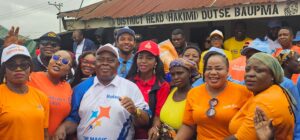
Steps to take:
- Organise Skills training programs: With the rise in unemployment, many people, especially youths, are turning to entrepreneurship. Rotary Clubs can set up vocational training programs where community members can learn trades such as cooking, baking, tailoring, farming, hairdressing, or even tech skills like coding, IT, how to repair mobile phones and graphic design. These skills will help them start small businesses, find employment, or become self-reliant.
- Rotary Clubs can also help provide access to microfinance services, through partnerships with local microfinance banks or organizations, they can offer low-interest loans or grants to help small businesses get started. In some cases, the club can serve as a guarantor for individuals who need financial support but lack access to formal banking.
- Scholarships and educational support. Despite economic challenges, education remains a pathway out of poverty. Rotary Clubs in Nigeria can offer scholarships to students from underprivileged backgrounds or help provide school materials like uniforms, books, and writing supplies.
- By promoting self-sufficiency, Rotary Clubs are helping to build a future where individuals and communities can thrive, regardless of the broader economic situation.
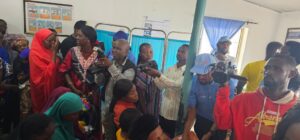
6. To build a vibrant Rotary Club, there is a need to Strengthen Membership, Keeping Rotary Alive.
For a Rotary Club to be effective, it must have a vibrant and active membership. However, in tough economic times, it may be challenging to attract new members or keep existing ones engaged, as people’s time and financial commitments are stretched.
Here are steps to take:
- Flexible membership options should be adopted, especially as not everyone may be able to afford traditional membership dues, especially during economic hardship. Rotary Clubs can explore flexible payment structures, reduced dues, or installment plans to accommodate more people. Some clubs also offer membership sponsorships, where financially stable members can support others who are passionate about service but unable to pay the dues.
- Offer value beyond service. Being part of a Rotary Club should offer members personal and professional growth. Clubs can invite guest speakers, offer training in leadership or project management, and create opportunities for members to network and build connections. These activities not only keep members engaged but also add value to their lives.
- Encourage participation in small ways. In economic hard times, some members may not be able to contribute financially but can still give their time and skills. Create opportunities for members to volunteer in various capacities, from organizing events to helping with administrative tasks.
- Maintaining a strong membership base is essential for the continuity and vibrancy of the club. Flexible membership options and opportunities for personal development can help ensure that members remain active and committed.
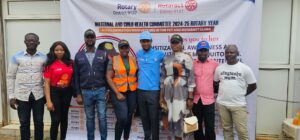
7. Building a Vibrant Rotary Club there should be avenues for Impactful Fundraising, i.e Creative Ways to Raise Money in Tough Times.
Fundraising is a significant part of Rotary’s ability to carry out service projects, but it’s often more challenging during economic hardship. However, Rotary Clubs can get creative with their fundraising efforts to continue financing their activities.
Steps to take:
- Crowdfunding. With the increasing use of social media and digital platforms, Rotary Clubs in Nigeria can set up crowdfunding campaigns to raise funds for specific projects. Platforms like GoFundMe or even local platforms can be effective, especially if the campaign is well-marketed.
- In-kind donations. Instead of always seeking cash, clubs can ask for donations of goods or services. For instance, if a club is organizing a medical outreach, they can request hospitals, clinics, or pharmacies to donate medications, medical equipment, or health services.
- Host community events. Organizing fun community events, such as charity football matches, talent shows, or cultural days, can raise funds while also bringing the community together. Events like these often draw support from local businesses that are willing to sponsor or donate prizes.
These approaches can make fundraising more accessible and ensure that Rotary Clubs continue their good work without relying solely on direct financial contributions.
In conclusion, leading in challenging times, especially in Nigeria’s economic situation is undeniably tough, but that does not mean Rotary Clubs cannot thrive. By focusing on empowerment, leveraging community resources, promoting flexible membership options, and getting creative with fundraising, Rotary Clubs can not only survive but make a lasting and meaningful impact in their communities.
The motto of Rotary—”Service Above Self”—is even more critical in challenging times. Now more than ever, Rotary Clubs in Nigeria have the opportunity to lead, serve, and inspire, building stronger, more resilient communities despite the economic hardships. By remaining focused, adaptable, and committed to service, Rotary can continue to be a force for good, transforming lives one community at a time.
News
Four SANs join Agabi to defend Nnamdi Kanu
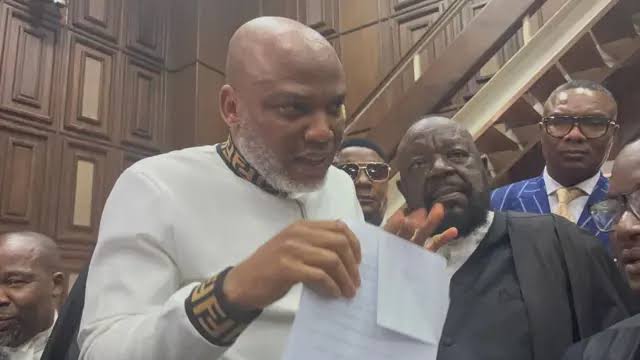
Indigenous People of Biafra (IPOB) leader Mazi Nnamdi Kanu has added four Senior Advocates of Nigeria (SANs) to his defence team.
The additions bring the number of SANs on the team to six.
In addition to Chief Kanu Agabi (SAN) and Uchenna Njoku (SAN), the new SANs are Prof Onyechi Ikpeazu, Emeka Etiaba, Mela Audu Nunghe and Dr. Joseph Akubo.
They will all be in court today as well as on May 2 and 6 as Kanu’s trial continues.
A member of Kanu’s legal team, Aloy Ejimakor, provided the update via his verified X handle @AloyEjimakor.
The Federal Government on March 21 re-arraigned Kanu before Justice James Omotosho on a fresh seven-count charge bordering on terrorism.
Kanu apologised for his February 10 verbal attack on Justice Binta Nyako, who recused herself from the case.
The IPOB leader said Justice Nyako “did not deserve the unjust attack.”
He tendered his apologies through Agabi, a former Attorney General of the Federation and Justice Minister.
The SAN attributed Kanu’s outburst to anger and urged everyone to forgive him.
“He has been angry for a long time and therefore he should not have spoken when he was angry,” Agabi said.
News
Borno govt reintegrates 300,000 former Boko Haram terrorists
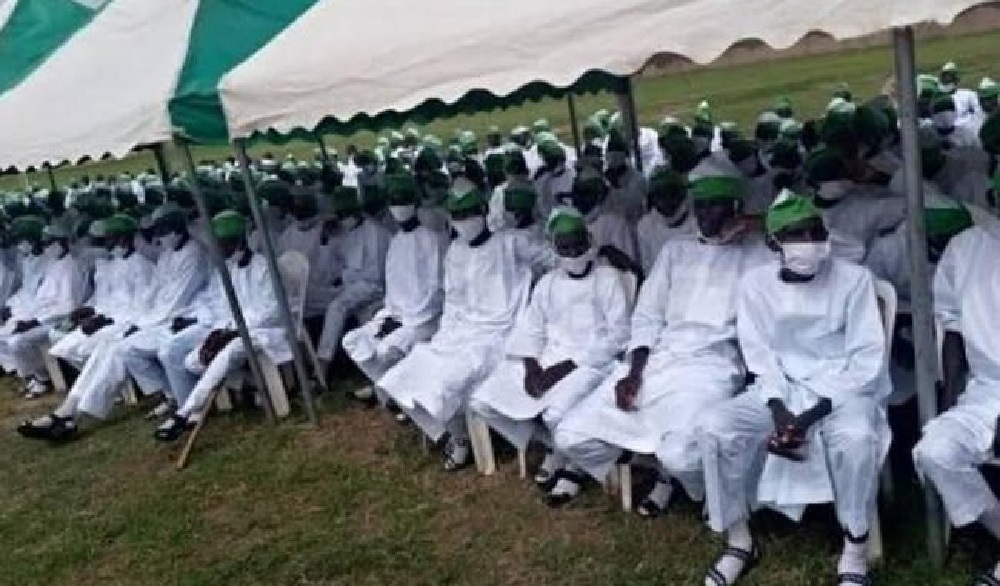
Borno State Governor, Babagana Zulum, has disclosed that the state has reintegrated no fewer than 300,000 repentant Boko Haram terrorists over the past three years.
Governor Zulum made the revelation while receiving the Minister of Defence, Badaru Abubakar; the Chief of Defence Staff, Gen. Christopher Musa; and other top military commanders during their visit to Maiduguri.
“Borno State has, within the last three years, received more than 300,000 repentant Boko Haram fighters — and not all of them are fighters. Some of them are farmers,” he said.
While acknowledging the efforts of the Nigerian military, the governor noted that several challenges continue to hamper the effective fight against terrorism and called for urgent interventions.
He stressed the importance of combining kinetic and non-kinetic approaches in the ongoing counterterrorism efforts.
“Manpower is very essential. While I’m aware of the constraints of the Nigerian Army — because right now, you are everywhere in Nigeria: the North-East, North-West, North Central, as well as southern Nigeria — I’m aware of your limitations,” he said.
“But still, considering the northeastern region, the Nigerian Army should look into the possibility of sending more trained manpower. There is a difference between Boko Haram, ISWAP, and bandits.”
Governor Zulum further warned of the growing external support for terrorist groups operating in the region.
“ISWAP and Boko Haram are terrorists getting support internationally, and looking at our porous borders, they remain infiltrated through the Sahel, which is our major problem.”
He emphasised the strategic importance of securing the Sahel to achieve lasting peace across Nigeria.
“If the Sahel is not secured, Nigeria will never be secured. So, there is a need for us to fortify the security situation in the Sahel with a view to ending the crisis in the entire nation.”
The governor also called for enhanced air capabilities to counter the evolving threats posed by terrorist groups.
“We need air support. I know the kind of constraints you face accessing fighter helicopters and others, but attack helicopters are very important in these areas, and drones are also very important.”
Highlighting recent developments, he said: “The last attack that happened in Wulgo, carried out by ISWAP and Boko Haram — a confirmed statement said it was carried out with the support of armed drones. They hit the MNJTF (Multinational Joint Task Force) with drones.
“This is the time for the Nigerian military to rise again and procure sophisticated drones and anti-drone equipment so that we get rid of these problems.”
Governor Zulum described the situation as a serious setback not only for Borno State but for the entire Northeast region.
News
Court orders Aisha Achimugu to appear before EFCC today

Justice Iyang Ekwo of the Federal High Court in Abuja, has ordered Aisha Achimugu to appear before the Economic and Financial Crimes Commission (EFCC) on Tuesday (today) to answer questions regarding an ongoing investigation.
The judge also directed that she must appear before the court on Wednesday, April 30, 2025.
The gave the order in a ruling he delivered on Monday, April 28, 2025, in respect of a suit marked FHC/ABJ/CS/626/2025, filed by Achimugu against several law enforcement agencies, including the Nigeria Police Force, the Independent Corrupt Practices and Other Related Offences Commission (ICPC) the Department of State Services (DSS), the EFCC, the Nigeria Security and Civil Defence Corps (NSCDC) and the Nigeria Immigration Service (NIS).
In its response to Achimugu’s application, lawyer to EFCC, Ekele Iheanacho (SAN), informed the court of a counter-affidavit deposed to by one of its investigators, Chris Odofin, outlining the circumstances leading to her invitation.
In the affidavit, Odofin disclosed that Achimugu is under investigation for alleged conspiracy, obtaining money by false pretence, money laundering, corruption and possession of property reasonably suspected to have been acquired through unlawful means.
Achimugu had initially honoured the Commission’s invitation on February 12, 2024, during which she made a written statement and was subsequently granted administrative bail through her lawyer and surety, Darlington N. Ozurumba.
But she allegedly failed to report back as agreed, choosing instead to file a fundamental rights enforcement suit against the Commission.
The affidavit further revealed that Achimugu, in her statement, explained the inflow of N8.71billion into her corporate bank accounts as an ” investment fund” for the acquisition of an oil block.
She claimed the funds were transferred to the Federal Government’s account through her company, Oceangate Engineering Oil and Gas Limited, referencing documentation from the Nigerian Upstream Petroleum Regulatory Commission, NUPRC.
Further investigation in the affidavit however, indicated that Achimugu’s company actually acquired two oil blocks, Shallow Water PPL 3007 and Deep Offshore PPL 302-DO at the cost of $25.3 million.
Investigations showed that the payments were allegedly made in cash via bureau de change operators and that the ultimate sources of the funds could not be traced to any legitimate business income or partnerships.
The Commission also alleged that the acquisition process was fraught with corruption. Despite the acquisition, neither of the two oil blocks had commenced exploration or production as of the time of investigation.
The EFCC stressed that Achimugu’s current suit is a calculated attempt to frustrate the ongoing investigation, despite a previous court decision in suit No. FHC/ABJ/CS/451/2024 dismissing her claim of fundamental rights violations.
Following the dismissal of the earlier suit, the EFCC continued its investigation by dispatching inquiry letters to various banks and the Corporate Affairs Commission (CAC), the Federal Inland Revenue Services (FIRS), Land Authorities, Special Control Unit against Money Laundering (SCUML), Central Bank of Nigeria (CBN) to gather more evidence. As more responses were received, the team analysed them while further responses are being awaited.
The affidavit also shows that Aisha Achimugu operates a total of 136 bank accounts across 10 different banks both in her personal and corporate names.
The case continues on Wednesday, April 30, 2025 with Achimugu expected to report to the EFCC on Tuesday as directed by the court.
-
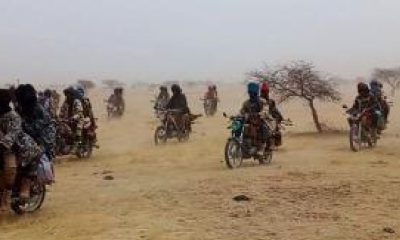
 News22 hours ago
News22 hours agoInsecurity: BUDA urges govt to quickly rescue Baruten from terrorists
-

 News24 hours ago
News24 hours agoUNUSUAL! Without invitation, Police declared me wanted — Daughter of ABC Transport owner
-
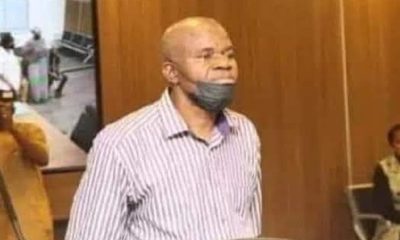
 News19 hours ago
News19 hours agoBreaking: Late gospel singer Osinachi’s husband sentenced to death by hanging
-

 News4 hours ago
News4 hours agoCourt dismisses Emefiele’s bid to reclaim forfeited 753 duplex estate
-
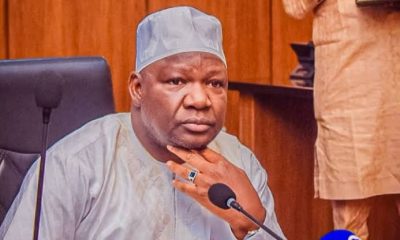
 News20 hours ago
News20 hours agoWeeks to 2nd anniversary, Niger deputy gov, plans to resign, move out personal effects
-

 Entertainment23 hours ago
Entertainment23 hours agoMy tongue slipped, Annie Macaulay apologizes after referring to Herself as ‘Idibia’ at Headies 2025
-

 News18 hours ago
News18 hours agoVatican: Conclave to elect a new pope will start on May 7
-

 News18 hours ago
News18 hours agoSultan declares Tuesday first day of Zulki’ida 1446AH






